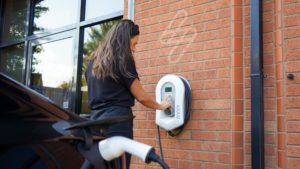In recent news, conflict within OPEC has been causing a lot of uncertainty and anxiety. On July 18, OPEC resolved to respond to rising prices by boosting supplies, hardly an environmentally responsible solution – and it will do nothing to reduce anxiety that inevitably will continue to be fueled (pun intended) by rising oil prices. But what if cities, countries, and individuals were less dependent on oil and could thus break away from dependence on rising oil prices?
Our economies, daily commutes, industries, and family vacations would clearly benefit. Whenever there is an oil price increase, it affects everything from filling up your car at the pump, increasing the price of plane tickets, the manufacturing, shipping, and transportation of goods and materials. If we were less dependent on oil and relied more on sustainable renewable energy sources, this conflict would be less relevant.
The reason conflict within OPEC is such a stressor is that fossil fuels – coal, oil, and gas – account for 79% of the world’s energy production. As important as it is to switch to more sustainable sources of energy for environmental purposes, the argument can be made just as much for economic purposes. The costs of fossil fuels and nuclear power depend largely on two factors, the price of the fuel that they burn and the power plant’s operating costs.9 Renewable energy plants are different: their operating costs are comparatively low and they don’t have to pay for any fuel; their fuel doesn’t have to be dug out of the ground, their fuel – the wind and sunlight – comes to them.

The person who drives an electric car is less worried about the financial impact of an increase in price for gas at the pump compared to the person who drives a standard internal combustion engine.
The same can be said about aviation. Sustainable Aviation Fuel (SAF) is amongst the most mature breakthrough sustainable technologies for the aerospace industry. Made from renewable waste materials such as used cooking oil instead of crude oil. According to GreenBiz, more than 40 airlines globally already have implemented SAF at this stage, with an estimated 200,000 commercial flights using SAF since 2011 and 1.6 billion gallons of SAF committed to forward purchasing agreements. The airlines that have implemented SAF will be less vulnerable to increased crude prices along with their customers not having to feel increased ticket prices. Increased ticket prices cause individuals to travel less, hurting economies.
At the end of the day, oil and OPEC is big business. OPEC wants people, economies, and societies to be as dependent on oil as possible, consuming as much as possible. This is the outcome of inefficiencies and dependencies in vehicle and plane manufacturing, production, and transportation. If the car someone drives runs on gas and the planes people fly on run on gas, oil companies want these sources of transportation to burn as much fuel as possible as a reason to buy more. In return, when a dispute within OPEC makes news, it sets off anxiety among investors and consumers and economies and markets are hit hard.
European oil majors including Shell, Total, Repsol and BP are responding with a different strategy. They are embarking seriously down a path toward emission reductions and the diversification of their businesses into renewables, e-mobility and other energy services. When the oil giants are diversifying into renewables, this is a good sign that they see themselves as the energy source of the future both for environmental and economic reasons. “The argument that has often been put forward is that they can’t invest in renewables because renewable projects offer much lower returns than oil and gas projects. That argument no longer holds at $35 per barrel,” Valentina Kretzschmar, director of corporate research at Wood Mackenzie, told GTM. “Average returns from oil and gas projects are now the same as renewables projects and, in fact, renewables projects are much lower risk. Already, we have seen companies like Occidental cutting dividends by 90 percent. It’s a discretionary spend,” she added.
So how are some oil majors diversifying into renewables? British Petroleum spent $200m in 2017 on acquiring a 43% stake in Lightsource, which has rebranded to Lightsource BP and is Europe’s largest solar power project developer. In 2018, the firm made three investments to prepare for a low-carbon future. The first of which was a $20m investment in StoreDot, an Israeli developer of rapid-charging batteries. BP then made a $5m investment in US company FreeWire, which makes fast-charging infrastructure for electric vehicles. And finally, $160m was spent on acquiring Chargemaster, the UK’s leading network of charging points. This allowed the oil firm an opportunity to combine Chargemaster’s 6,500 charging points network with its 1,200 petrol stations.
Shell’s investment target for green energy projects was set between $4bn and $6bn for the period from 2016 until the end of 2020. The Anglo-Dutch firm’s 2016 New Energies strategy covers several areas including electricity, wind and solar, electric vehicle charging, and initiatives to encourage the adoption of hydrogen fuel cell electric vehicles. It spent a reported $2bn on setting up a low-carbon energy and electricity generation business in 2016 – ensuring it was on course to meet its targets at the time. The following year, it acquired UK-based electricity and gas provider First Utility, as well as Europe’s largest electric vehicle charging company NewMotion. In 2018, Shell bought a 44% stake in US solar power firm Silicon Ranch for $200m and made a $20m equity investment in India-based renewable power company Husk Power Systems.
Total’s plan for renewables is equally remarkable. It plans to invest $500m a year in clean energy technologies. That figure is about 3% of the French oil major’s total capital expenditure, with plans in place to ramp that up to 20% over the next 20 years. Over the past 10 years, it has made a number of strategic investments, which included $1.4bn being spent on acquiring a 60% stake in US solar firm SunPower in 2011.
Total is aiming to become a global integrated leader in solar power and has 1.6 gigawatts (GW) worth of capacity, and plans to increase that to 5GW over the next five years. In 2016, it purchased French battery manufacturer Saft for $1.1bn and bought Belgian green power utility Lampiris for $224m. Total acquired a 74% stake in the French electricity retailer Direct Energie for $1.7bn in 2018, propelling the company forward into being one of the top utility providers in France.
This suggests that there is another solution than the one adopted by OPEC. There is no need to continue with business-as-usual as they have done. The strategy followed by European oil majors – assuming they don’t deviate from their chosen path – could serve as a model for the whole world. There is little doubt that in the future, having exposure to other diversified energy assets, such as renewables, could and does provide a hedge against oil price volatility as well.
As the European oil majors proceed on a more environmentally sound path, their business model changes. Eventually, they will have fundamentally very different cash flow profiles and will be obviously less reliant on oil and gas and other commodity prices. The more options for different forms of efficient, renewable, and sustainable energy sources, the less likely panic is to happen, and the easier it will be for economies to prosper and grow.
Editor’s Note: The opinions expressed here by Impakter.com contributors are their own, not those of Impakter.com
In the featured image: by Zbynek Burival, the sun setting on an oil well pump










